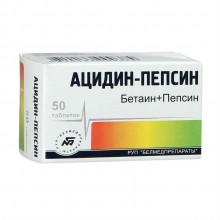



Pepsin is one of the main proteolytic enzymes of the digestive tract. It is produced in the cells of the gastric mucosa in an inactive form - as a proenzyme pepsinogen, which is converted into the active enzyme pepsin in the gastric contents. Acts at the initial stage of digestion of proteins in the digestive tract; hydrolyzes proteins to peptides in the acidic environment of the gastric contents; there are also amino acids among the hydrolysis products. At pH 5.0, stirs the milk.
Acidine (betaine hydrochloride) helps to increase the acidity of the gastrointestinal juice, creates the optimum pH for pepsin activity. 0.4 g of betaine hydrochloride correspond to approximately 16 drops of diluted hydrochloric acid.
Pharmacokinetics
Pepsin exhibits optimal activity at a pH of 1.4-2.5; in the case of an increase in pH, the activity decreases; at a pH of more than 6.0, it ceases. Destroyed in the duodenum under the action of pancreatic enzymes.
Betaine hydrochloride, when introduced into the stomach, is readily hydrolyzed to release free hydrochloric acid.
Hypo-and anacid gastritis, Akhiliya, dyspepsia.
1 tablet contains:
active substances: acidin (betaine hydrochloride) - 200 mg, pepsin - 50 mg.
No customer reviews for the moment.
Acidin-pepsin is taken orally, during or after a meal, pre-dissolved in 50-100 ml of water. Adults take 0.5 g 3-4 times a day, children 62.5-125 mg (1/4 pill of 0.25 mg) 3-4 times a day.
Allergic reactions, heartburn, gastralgia.
Hypersensitivity, hyperacidity of gastric juice (including gastric ulcer and duodenal ulcer, erosive gastroduodenitis).
The effect is reduced with the simultaneous use of bases (antacids), heavy metals, tannin, acid-reactive drugs. Pepsin is destroyed by alcohol.